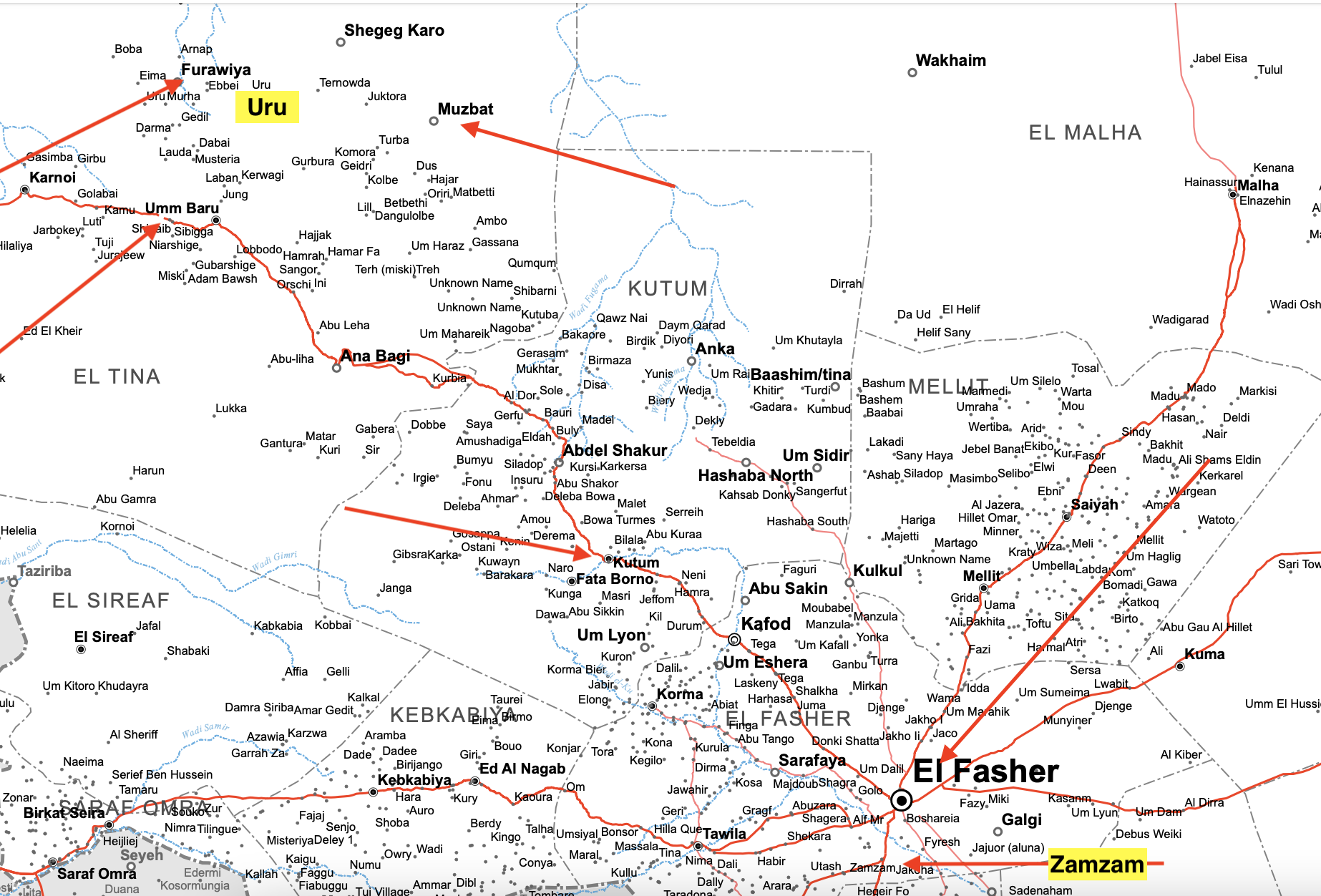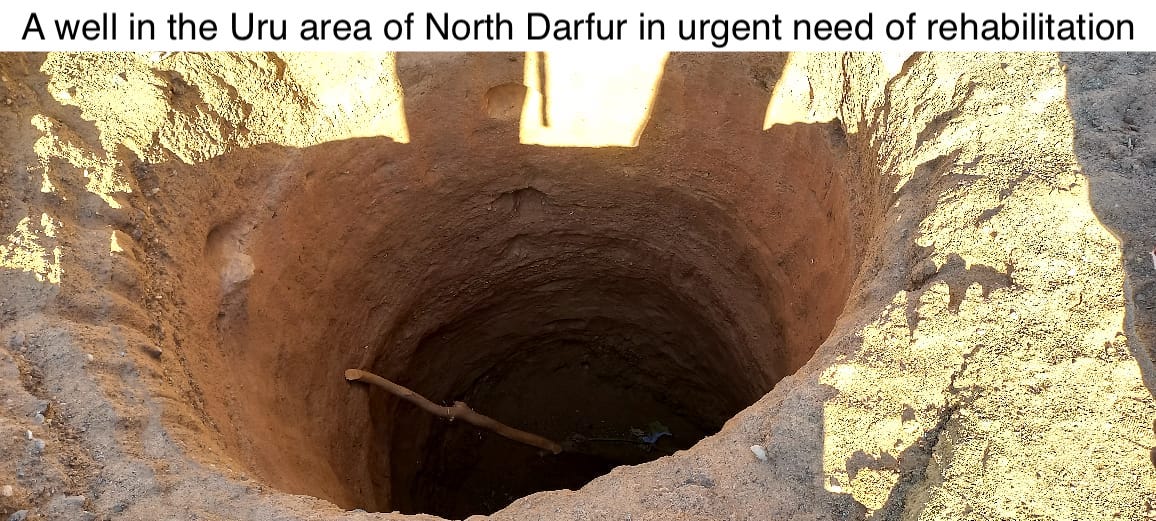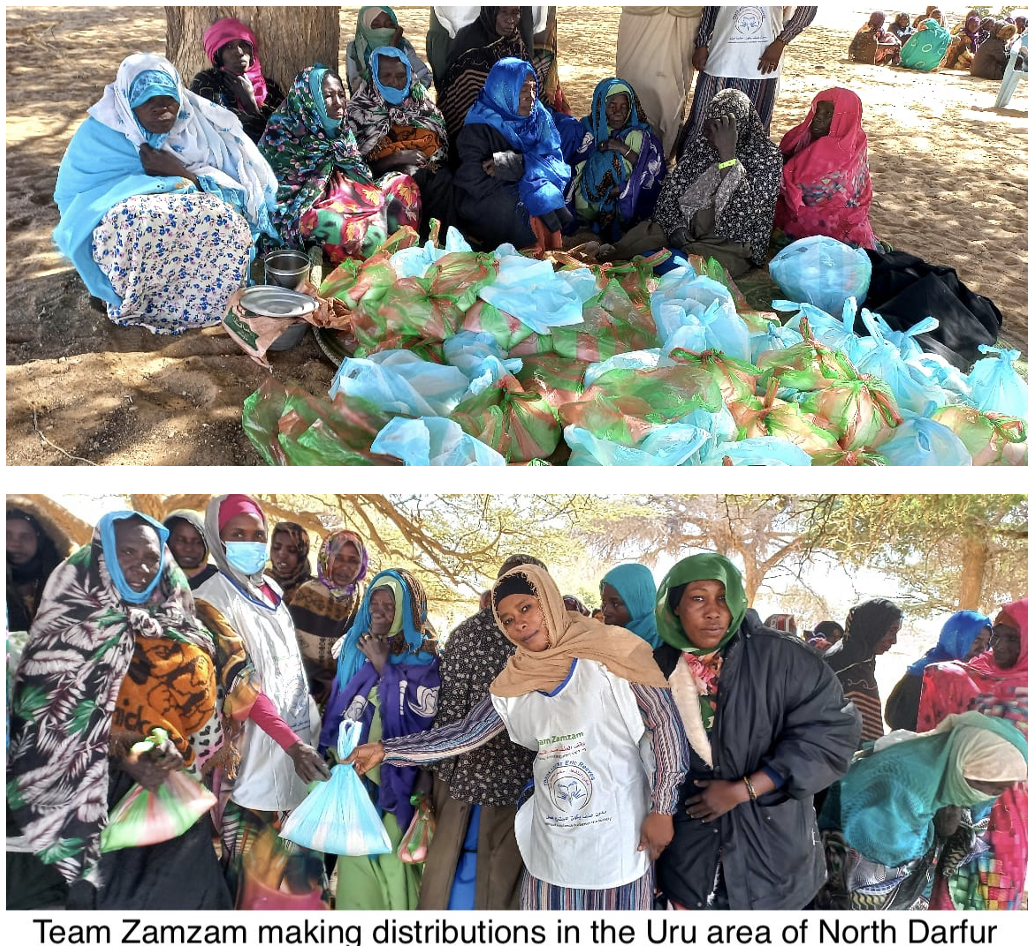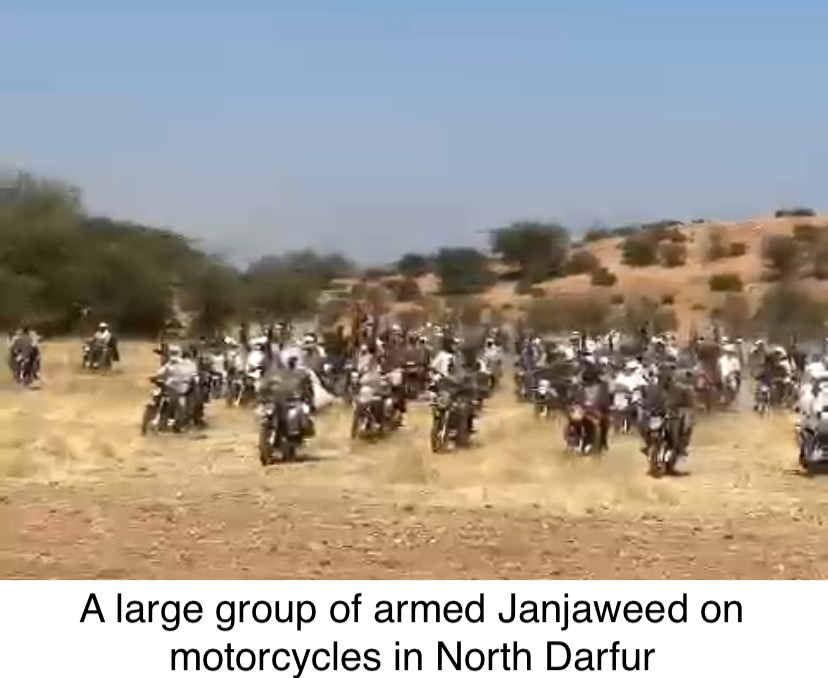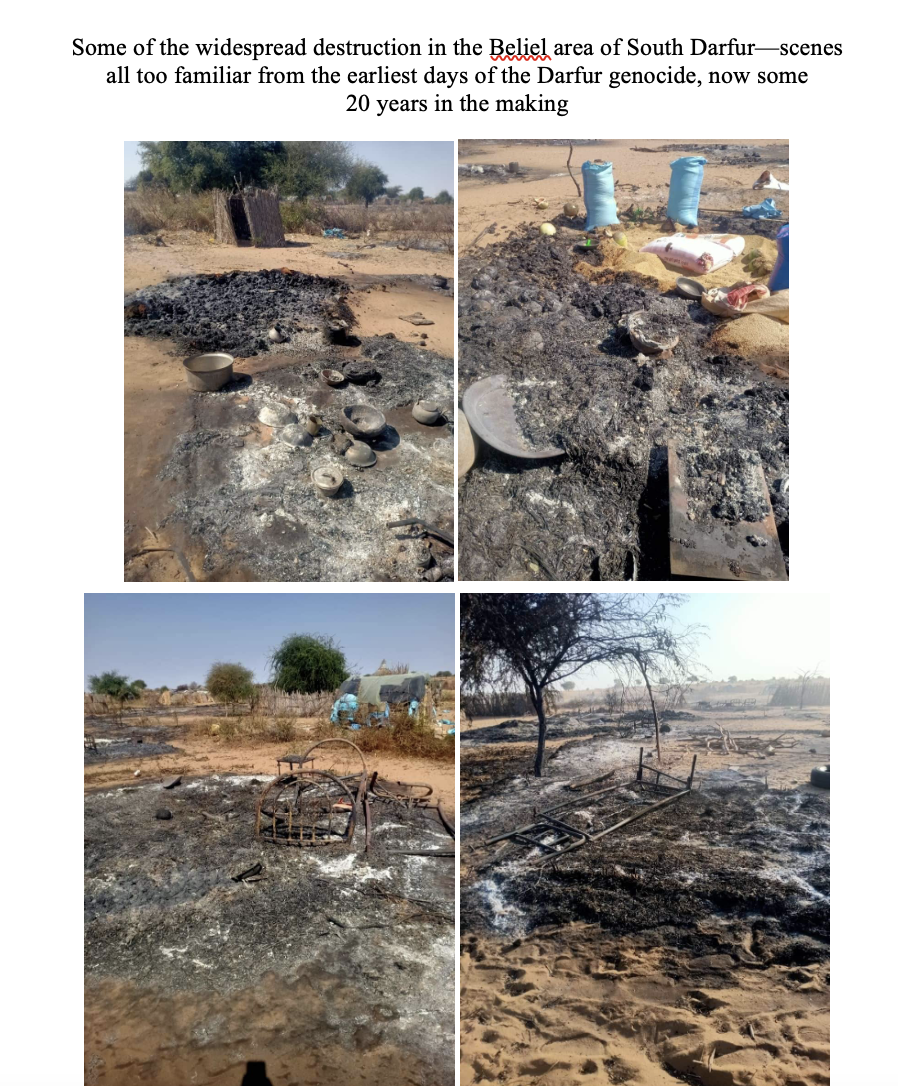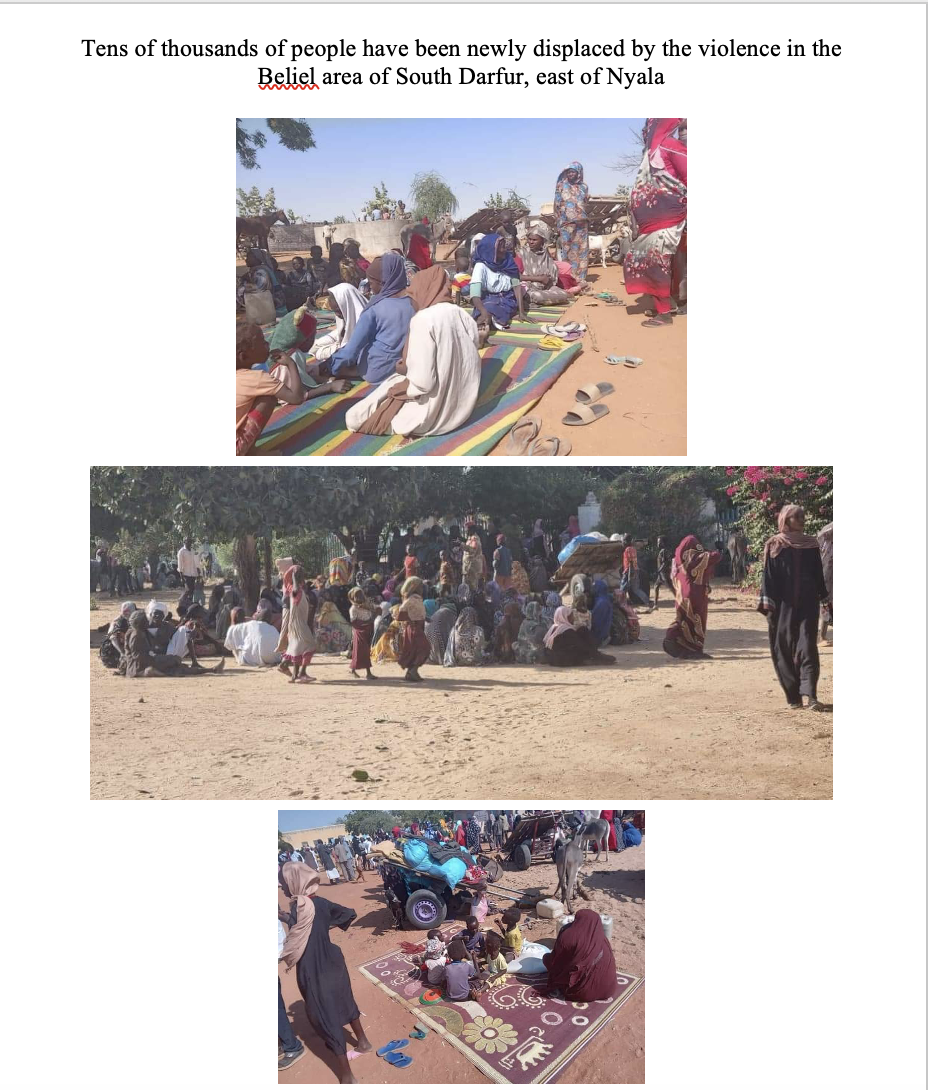ANNEX: Project Update, January 29, 2023: Responding to Sexual Violence in Darfur
January 2023 Update by the Coordinating Counselor of Team Zamzam (received January 21, 2023); translated by Gaffar Mohammud Saeneen
OVERVIEW
This monthly report for January 2023 comes against the backdrop of the recent savage attacks against defenseless citizens in several villages near the capital of South Darfur (Nyala) at the end of last December. These attacks were followed by several similar attacks on other villages in a number of nearby places.
Two weeks after these attacks four Team Zamzam counselors, accompanied by the team’s security personnel, made a visit to the far north of North Darfur to assess the conditions of those who live in remote areas and villages in Umm Baro locality; the findings are included in this report.
PART ONE: A dangerous but worthwhile trip
On the third day of the new year, January 3, 2023—accompanied by some local organizations heading to Kutum—we took off from El Fasher. Our intended destination for this perilous journey is the locality of Umm Baro, specifically the Uru area North of Muzbat and its neighboring villages.
[For geographical orientation, see the map below—ER]
The locality of Umbro is located north of Kutum in the northwest part of North Darfur State; it is approximately 300 kilometers from El Fasher. We left El Fasher in three small cars hired by a local charity that was heading to the locality of Umm Baro. At the outer gate of El Fasher, we joined a convoy of large trucks heading to various areas of North Darfur. There we waited for nearly two hours for the final signal and readiness of the security convoy that would accompany us to our intended destination.
The roads from El Fasher to these and other areas are rugged, with no paved roads, nor any light at night except the lights of travelling vehicles. Every few miles there were a number of potholes in the middle of the road; sometimes there were deep creeks and cracks left by autumn rains, which made travel after the sunset impossible.
During the trip, what was most striking was the complete absence of a rural population in those agricultural areas that previously served as the economic backbone of this North Darfur region, as well as an important supplier to larger cities like El Fasher. This journey—a distance of approximately 300 kilometers (180 miles)—took us roughly a day and a half. During our travels, we did not see any people except heavily armed camel herders who were criss-crossing the road. After our arrival in Umm Baro, we headed northeast to our destination, Uru, which was some 80 kilometers further. This Uru area—which is located to the northeast of Umm Baro—is under the administration of Muzbat, and has a population of about 23,000 people living in 28 villages.
The residents of these villages suffer from a lack of the most basic necessities of life: health, education, food and water. The purpose of our visit was to stand in solidarity with the communities living in these parts and to sit down and determine their most urgent needs. We hoped to discuss these issues with the relevant parties to study and find solutions.
In the midst of these forgotten villages, there is a village that connects them called Yakshi. In this village, there is only one mixed primary school, quite incomplete, its buildings built with materials such as firewood, reeds and grass.
The greatest problem is that there is no water: the main sources of water are wells that remain productive only until the end of December. In the autumn period, people depend on the water of ponds and valleys for a short and limited period, although the water is polluted with human and animal excrement. People are obliged to drink water that is unhealthy, containing a large quantity of microbes, such as urine parasites and several germs that cause giardia and dysentery, causing persistent diarrhea within the population. In the period of summer, they go on the back of donkeys and camels to fetch drinking water from the Farawiya area, which is about 60 kilometers away, and this often takes between three and four days depending on the speed of their animals and practical priorities.
Suffering and severe lack in the health care sector
An area with a population of this size, exceeding 20,000 people, also suffers from an acute shortage of health resources; they do not have a single health clinic let alone a true health centre. We noticed the residents of this forgotten village complaining of several diseases, including severe malnutrition among children. Moreover, we were able to take the following notes concerning the health situation:
[1] The spread of various skin diseases such as cutaneous leishmaniasis;.
[2] Many girls and women complaining of severe pain in their private parts of body (vaginal entry) which suggests symptoms of urinary fistula caused by sexual assault;
[3] Scorpion stings and snake bites;
[4] Severe infections from wounds and fire;
[5] Severe eye sores;
[6] throat infections, including tonsillitis;
[7] Widespread lack of immunization;
[8] Pregnant women suffering from a lack of medical care during and following pregnancy;
[9] Difficulty in childbirth, i.e., a traditional delivery with a rope, causing a number of illnesses and maternal deaths;
[10] Frequent use of herbs instead of medicines, causing a number of diseases.
As we indicate in this report, there is severe and continuous suffering on the part of schoolchildren in these villages, as there is only one school in the entire village community, which consists of more than 27 villages. And again, this school is built from the most rudimentary materials. It has only three usable classrooms; the other classrooms have completely collapsed. In addition, the students in this school suffer from a shortage of basic school materials, such as instructional books, exercise books, pamphlets, chairs, and school uniforms. Some of the students attending this school live a three-hour walk away, forcing them to spend between four to six hours on a daily basis going back and forth either on donkeys or by foot. When they reach school they feel tired and exhausted, and are psychologically unable and unwilling to absorb the lessons.
Recommendations from the people of the visited area
[1] Provision of a center for emergency rescue cases, including finding a solution to scorpion stings that kill quickly;
[2] Training environmental cadres to educate the citizens: because of the lack of bathrooms and water facilities, people are suffering from serious hygiene issues;
[3] Training a qualified cadre of midwives, first-aid personnel, and nursing assistants;
[4] Provision of health education guidelines, with pamphlets on personal hygiene, food hygiene, and the importance of not defecating in the open;
[5] Provision of drugs such as painkillers and antibiotics to replace treatment using herbs, which often do more harm than good;
[6] Providing vaccines for scorpion and snake bites, and training everyone on how to use them;
[7] Training a cadre of people informed about environmental issues and ways to combat harmful outdoor habits;
[8] Provision of school chairs, school uniforms, textbooks, and curriculum materials;
[9] Provision of therapeutic nutrition for malnourished children;
[10] Rehabilitation of classrooms, i.e., building classrooms for kindergarten children and pre-school education.
Pictures from visited area:
[1] Photograph showing the condition of the water wells, which has produced acute shortages of water in the area.
[2] Photographs of the people of the area during Team Zamzam’s distribution of basic necessities, such as sugar, flour, laundry soap, and tea.
PART TWO: Continuing violence against women and the deteriorating security condition around camps for the displaced:
On December 23, 2022 an armed group on camels violently assaulted eight girls from Zamzam camp who went out to fetch firewood west of the camp, four kilometers (2.5 miles) away. These eight girls were attacked by new settlers in the area and the Janjaweed occupying the areas southwest of the camp.
[Earlier reports from the coordinating counselor have detailed the movement of armed Arab groups closer and closer to Zamzam, especially from the southwest—ER]
One of the victims said: “We went out to fetch firewood and after reaching a wooded area near the village of Al-Jaw, the Janjaweed appeared and surrounded us on all sides and began to ask us questions: ‘Where did you come from? where are you going? and which tribes you belong to?’”
After they surrounded the girls, the Janjaweed began to beat them with whips and sexually assaulted them; after two hours of beating and humiliation, three of the victims managed to escape, leaving five behind. The Janjaweed chased the fleeing girls to the outskirts of the camp, but luckily they managed to escape into the camp. Immediately upon their arrival, the girls’ families left the camp and headed towards the area where the assaults took place; but the Janjaweed fled as they approached, leaving the five remaining victims badly traumatized.
Three Janjaweed brutes take turns on poor Fatima
On January 18, 2022, 23-year-old female victim Fatima Salem Noreen from Zamzam camp was gang-raped by three Janjaweed men. The incident occurred when she was on their farm, with her 64-year-old aunt, Maryam Ahmed Al-Mughalla. They were attempting to clean the farm after the agricultural season in the Abu Daleek area. The victim said: “At about one o’clock in the afternoon, we were in the shade of a tree for the purpose of resting and taking a nap, and suddenly three Janjaweed riding on camels attacked us, threatening us with weapons. Then they tied my aunt by her hands and feet, and then they beat her severely.”
Fatima said: “After that, the three of them took turns [sexually assaulting] me and kept going until I fainted and passed out.”
While the three brutes were taking turns on Fatima, her aunt remained tied up for about three hours. Only after Fatima had gathered some strength was she able to untie her aunt and take rest. Afterwards, they decided to return to Zamzam, but they could not find the donkey because the rope had been deliberately cut with a knife and the donkey was nowhere to be seen.
For her part, the victim’s aunt said: “The Janjaweed did their heinous acts in front of my eyes and fled towards Abu Daleek.”
The passers-by who helped them to reach Zamzam said: “We found them sitting on the side of the road which heads towards El Fasher, and the older woman was suffering from exhaustion and fatigue from long walking, visible bruises on her face and hands, while the younger one was badly traumatised, physically shaking, limping and bleeding.”
Upon their arrival, they were taken to El Fasher Emergency Teaching Hospital, where they were given first aid. Fatima then returned to her family in Zamzam. Fatima is still suffering from severe depression, but after quick intervention by Team Zamzam’s counselors, her psychological state is gradually improving. Her family sends warm thanks for the help and support she received from counselors.
Testimonial of patient after recovery: Halima Ibrahim Gedo
Halima started her adult life when she was nineteen years old; she lived in the Qilabat area. Halima gave birth to a first child, then a second child, but before the third child was born, she was diagnosed with a fistula. At the time, she was living in difficult conditions, and in her area there was no transportation and her family couldn’t afford to rent even a cart. So her family carried her on the back of a donkey to a destination eight hours away in El Fasher. On her way to El Fasher she miscarried before reaching the hospital.
After procedures and examinations with a specialist, Dr. Adam Salih, the doctor said that she had a urinary fistula and subsequently operated on her. She stayed in the hospital for a while but this first operation was unsuccessful. Six months after the first operation, her family collected some money through donations from extended family members, relatives and neighbours to help her pay for a second operation, but it too was unsuccessful.
After that, her health deteriorated badly, and this led to a divorce from her husband. After suffering for nearly two and a half years, Halima was on the brink of her last breath had
Team Zamzam had not intervened to take her to the hospital for a third operation, which was finally successful. After staying for two weeks in the hospital, she returned to Zamzam to resume her normal life. Recently, Halima sent the following message to the counsellors, in which she said: “You have brought me back to life from death and you can’t imagine how much this means to me. I owe you life, I owe life to anyone who helped me throughout those difficult days.”
The Barbarism of the Janjaweed (PART TWO continued)
Barbaric attacks by the Janjaweed have recently resulted in mass displacement; and it is clear that their campaign of killings and terrorising defenseless citizens is not random but calculated to depopulate the areas near Zamzam for the purpose of occupying the farmers’ lands. These recent attacks have not only made the matters worse amidst steadily worsening security, but places an unbearable burden on a rapidly deteriorating humanitarian situation. Therefore, a key goal in this monthly report is to shed light on the current security situation, highlighting the ongoing Janjaweed attacks and their catastrophic impact on security and humanitarian conditions.
Backgrounds of the events
The following comes from the opening words of one local report from Beliel, near Nyala, South Darfur: “The bloody events that took place at the beginning of the third week of December 2022 in Beliel locality opened wounds that have not yet healed in a region that has witnessed deadly conflict for many years.” In Beliel, within one week, dozens of people were killed and an unknown number wounded in the affected area; these atrocities were strongly condemned by a community that hopes for stability and a movement toward peaceful coexistence, development, and stability.
Ethnic cleansing
Eyewitnesses in South Darfur described the attacks on civilian villages in Beliel as systematic, amounting to ethnic cleansing in a number of villages in the area. A series of attacks have been launched by gunmen, some of them in the uniforms of the military forces. The attacks have left many dead, many wounded, and many missing persons. These reports come amid accusations of involvement by the Rapid Support Forces (RSF), under the overall command of Mohamed Hamdan Dagalo (“Hemeti”)
[Hemeti is one of the two primary leaders of the junta in Khartoum that came to power by military coup in October 2021—ER]
For his part, a spokesman for the Dajo Sultanate [the Dajo are one of the many non-Arab groups in Darfur—ER] said during a press conference in Nyala that the attack was carried out by gunmen wearing RSF uniforms and riding in heavily armed vehicles. Additionally, there were savage attacks by gunmen on motorcycles, camels, and four-wheel drive vehicles. The initial estimate of tangible losses as a result of the attacks exceeds 150 million Sudanese pounds. This has prompted calls for an urgent international investigation, noting that the attack on the villages aims to displace the indigenous population, and that some areas have already become settlements for new population groups.
Badr al-Din Muhammad, one of the leaders of the Dajo Sultanate, said at the press conference that what had happened was not a tribal conflict, but rather an attack on innocent, defenseless people by armed men with an intention to remove the indigenous population from their lands—and that this ethnically-targeted violence continues even after the declaration of a state of emergency.
Displaced by the events in the area of Beliel: life has become much harsher after the loss of property and the burning of villages
The Humanitarian Aid Commission (HAC) in South Darfur said that thousands of displaced people fleeing the bloody conflict in the east of the state are still living in harsh conditions after losing their savings and the complete burning of their homes and agricultural crops. According to HAC in South Darfur, approximately 16,200 people have been displaced; but this estimate seems dubiously low: according to people fleeing the attacks, the number may well have been more than twice the HAC figure.
HAC complained that the lack of humanitarian intervention was due to the seasonal holiday; but this complaint comes in the wake of warnings issued by the United Nations of renewed violence in the villages of the Beliel region.
The HAC commissioner for South Darfur said that those fleeing the violence have reached three large gathering areas: in Dumma camp in Mershing locality; another gathering in the town of Al-Ta’aisha in the Natika locality in the east; and a third gathering in the schools next to Dreij camp in the city of Nyala. The Commissioner belatedly indicated that the number of displaced persons was indeed much greater than initial estimates.
Furthermore, he also confirmed the arrival of teams of organizations to survey and assess the situation, in addition to the arrival of a little aid from the state government. He called for urgent contributions, given that humanitarian organizations intervene only after surveying and evaluating the humanitarian situation; the commissioner indicated that he urged humanitarian organizations to speed up the intervention.
Local charities said that there are an estimated 292,229 people living in Beliel locality, of whom around 246,339 are in urgent needs of humanitarian assistance, according to the 2023 review. About 43,834 people are likely to reach the food security “crisis” level or an even higher, more dangerous level. Food insecurity reports from the Integrated Food Security Phase Classification (looking at the period October 2022 to February 2023), predict worsening conditions.
Children are separated from their families while women pay a high price amidst the violence
For his part, a spokesman for the displaced in Dumma camp, Muhammad Abkar, revealed that there are many children separated from their families, who fled from the areas of violence to Dumma camp; they simply don’t know where their parents are. He called on the state government and charitable organizations to help them search for their loved ones, as well as provide them with urgently needed humanitarian aid.
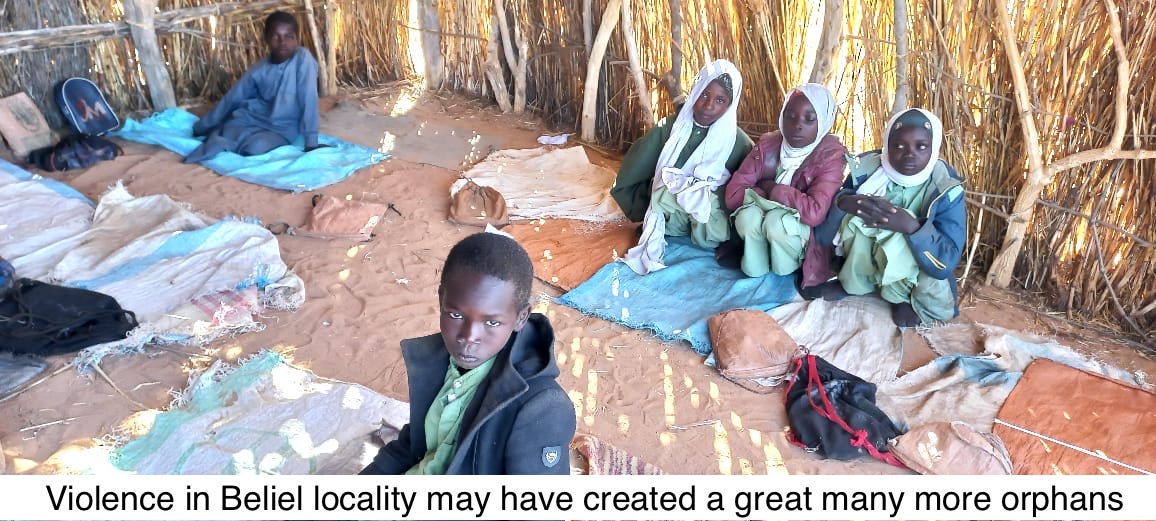 Regarding the situation of children, the United Nations Children’s Fund (UNICEF) expressed its concern about the fate of children as a result of the clashes in South Darfur; it has called for greater protection from violence and harm. The organization said it was concerned about the renewed clashes, which are once again making children vulnerable to danger and violence. In addition, a spokeswoman for the women of Ta’isha camp, Shadia Ahmed Abdel-Jabbar Arbab, spoke urgently about the need to protect women fleeing from violence, since they often bear the brunt of assaults.
Regarding the situation of children, the United Nations Children’s Fund (UNICEF) expressed its concern about the fate of children as a result of the clashes in South Darfur; it has called for greater protection from violence and harm. The organization said it was concerned about the renewed clashes, which are once again making children vulnerable to danger and violence. In addition, a spokeswoman for the women of Ta’isha camp, Shadia Ahmed Abdel-Jabbar Arbab, spoke urgently about the need to protect women fleeing from violence, since they often bear the brunt of assaults.
Abdul-Jabbar referred to the local security committee of Beliel and the state security committee about an expected attack by the militias, but the government did not respond to the plea for protection. “The state security committee arrived five days after the militias invaded the villages and burned them completely,” she added.
Accusations of involvement of Rapid Support Forces in the attacks and the denials of its leaders
Several local activists who visited gatherings of displaced victims of the recent events, in Ta’aisha, Fasha, and Dumma, recorded the testimonies of several women who accused the Rapid Support Forces of supporting armed Arab groups—and indeed of RSF involvement in the attacks on villages and towns in northeastern South Darfur. They vigorously condemned the Rapid Support Forces during the State Security Committee’s visit to the IDPs gatherings.
Rapid Support Commander, Mohamed Hamdan Dagalo (“Hemeti”) said that investigations into the events of local areas will reveal the truth, and that it will be different from the past. Additionally, Hemeti announced during his visit to the area that all of his forces who appeared in the video recordings had been arrested and transferred to prison until they are to be handed over to the investigation committee to decide on their cases.
[Hemeti’s promise is completely worthless: he has a long and utterly shameless record of the most outrageous lies—and for good reason, given his denial that he played a central role in ethnically-targeted violence throughout Darfur beginning in 2013, when was appointed to lead the RSF by former President al-Bashir. Hemeti has more blood on his hands than any other violent actor in Darfur—ER]
Without evidence Hemeti accused unnamed figures of trying to discredit his forces by filming some of the Rapid Support Forces who appeared in the videos [of attacks on the Dajo villages]. He pointed out that the investigations will show the facts, and said that “his forces moved to the scene of the events, accompanied by joint forces, in implementation of the directives of the State Security Committee.”
[Not a word of this can be trusted—ER]
[1] Photographs showing the devastation and damage resulting from the brutal attacks at the end of December 2022 in the area of Beliel South Darfur.
[2] Photographs showing the miserable conditions and daily suffering which the displaced people who fled the recent attacks endure.
PART THREE: Work carried out by Team Zamzam during January 2023 in Zamzam IDP camp
In the distribution of basic necessities for the month of January, priority was given to the desperate people in the area visited north of Kutum: they are severely suffering from extreme shortages. The inhabitants of these isolated villages suffer from two things: the first is their remoteness: the long distances make the cost of transporting basic necessities, such as food and medicine, exorbitantly costly; and the second is the lack of security. The local merchants hesitate to risk taking many of the roads for fear of assaults.
The economic deterioration and currency collapse over the past two years in Sudan has hit the country’s peripheral communities in Darfur especially hard—both internally displaced people and the people in remote areas suffer from the punishing increase in prices, as the cost of even the most basic necessities has more than doubled. For example, today we find that a sack of sugar containing 50 kilograms in El Fasher at a price of around $54; but in those distant areas the price is twice as much. People in these remote areas long to be able to afford basic commodities, such as sugar and medicines; meanwhile, schooling suffers from malnutrition and shortages of school materials.
On this trip month’s assessment trip to the area north of Umm Baro, Zamzam team’s counselors took with them food supplies consisting of the following:
400 kilos of sugar
150 kilos of flour
12 kilos of tea
800 bars of laundry soap
2 dozen school uniforms for children
The number of beneficiaries of the distribution:
282 families benefited
The total number of people benefiting is 814
Counseling sessions for victims of sexual violence in Zamzam:
67 individual counselling sessions
31 group counselling sessions
Hygiene kits:
Total of 12 boxes
Benefited 12 persons
Various other activities and work:
A well, i.e., a manual water pump, has been repaired in Zamzam, Sector C. We found that they were in urgent need of water in the neighborhood, which is located next to Mustafa Elementary School. At this neighbourhood school, students and teachers all suffered from the water problem; but now the problem has been resolved and everyone is happy.
A total of 71 people suffering from various illnesses, including two fistula patients, were accompanied to different hospitals in El Fasher to receive necessary examinations and medical treatments.
A total of 14 different visits were undertaken within the four sectors of the camp to take notes, speak to neighbourhood representatives, and to discuss with various women’s groups their concerns and points of views.
